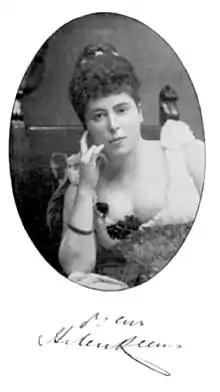Ellen Buckingham Mathews
Ellen Buckingham Mathews (1853–1920) was a popular female English novelist during the late 19th and early 20th centuries. She was also known as Mrs Reeves[1] after her marriage in 1877 to Dr. Henry Albert Reeves (1841–1914)[2][3][4] but was best known under her pen name, Helen Mathers.[2] She was born in Misterton, Somerset. Her first novel, "Comin' thro' the Rye" was published in 1875. It was partly based on people in her life and on her own early romantic experiences. She also acknowledged Rhoda Broughton as an early influence. She continued to write until her death.

She was educated at a boarding school in Chantry near Frome in Somerset. In her first novel, "Comin' thro' the Rye" she describes some of her experiences at school. "Mr Russell" in the novel was the Rev. Mr. Fussell in real life, who was the Lord of the manor and founder of the school. In the novel she calls the village Charteris. From 1875 to 1895 the novel sold over 35,000 copies.[2]
Due to a confusion of titles, some sources attribute a number of books by Scottish novelist Anne S. Swan to Mathers. Mathers published a short novel entitled "Land o' the Leal, by the Author of Comin' Thro' the Rye" in 1878. Swan published "The Land o' the Leal" (same title except with the addition of "The," completely different book[5]) using her male pseudonym David Lyall, in 1896. Conflating the two different novels with the same title has led some people to assume (erroneously) that David Lyall is Mathers's pseudonym. It is not.
Bibliography
- Comin’ Thro' the Rye, 1875
- The Token of the Silver Lily, 1877. Poetry
- Cherry Ripe!: A Romance, 1878
- Land o' the Leal, 1878
- As He Comes up the Stair, 1878
- My Lady Greensleeves, 1879
- Story of a Sin, 1882
- Eyre's Acquittal, 1883
- Sam's Sweetheart, 1883
- Jock o' Hazelgreen, 1884 (also contains "The Land o' the Leal" and other stories)
- Found Out: A Story, 1885
- Murder or Manslaughter, 1885
- The Fashion of this World, 1886
- Blind Justice, 1890
- The Mystery of No 13, 1891
- My Jo, John: A Novel, 1891
- T'other Dear Charmer, 1892
- The Fate of Fenella, 1892. Mathers contributed one chapter to this multi-author novel.
- A Study of a Woman, 1893
- What the Glass Told, 1893
- A Man of Today, 1894
- The Lovely Malincourt: A Novel, 1895
- The Rebel, 1896
- The Juggler and the Soul, 1896
- The Sin of Hagar, 1896
- Bam Wildfire: A Character Sketch, 1898
- Becky, 1900
- Cinders: A Novel, 1901
- Honey, 1902
- Venus Victrix (What the Glass Told; The Mystery of No. 13; What the Glass Told; My Jo, John), 1902
- Dahlia and Other Stories, 1903
- Dimples, 1903
- Griff of Griffithscourt, 1903
- The Face in the Mirror and Other Stories, 1903
- The New Lady Teazle and other stories, 1903
- Side-shows, 1904
- The Ferryman, 1905
- Tally, Ho!, 1906
- Pigskin and Petticoat, 1907
- The Pirouette and Other Stories (2nd edition, 1907)
- Gay Lawless, 1908
- Love the Thief, 1909
- Man is Fire, Woman is Tow and Other Stories, 1912
References
- "Mathers, Helen (Mrs. Henry Mathers)". Who's Who: 1667. 1919.
- "Mathers, Helen". The Longman Companion to Victorian Literature (2nd ed.). 2009. p. 426.
- "Henry Albert Reeves". The Midland Medical Miscellany. 1 (5): 65–66. 1882.
- "Reeves, Henry Albert". Who's Who: 1676. 1913.
- See HathiTrust copy of title page: https://hdl.handle.net/2027/coo.31924013539303
- Maunder, Andrew. "Reeves, Helen Buckingham". Oxford Dictionary of National Biography (online ed.). Oxford University Press. doi:10.1093/ref:odnb/55633. (Subscription or UK public library membership required.)
External links
- Works by or about Ellen Buckingham Mathews at Internet Archive
- Works by Ellen Buckingham Mathews at LibriVox (public domain audiobooks)

- Louis Antoine Godey, Sarah Josepha Buell Hale (1897). Godey's Magazine. The Godey company.